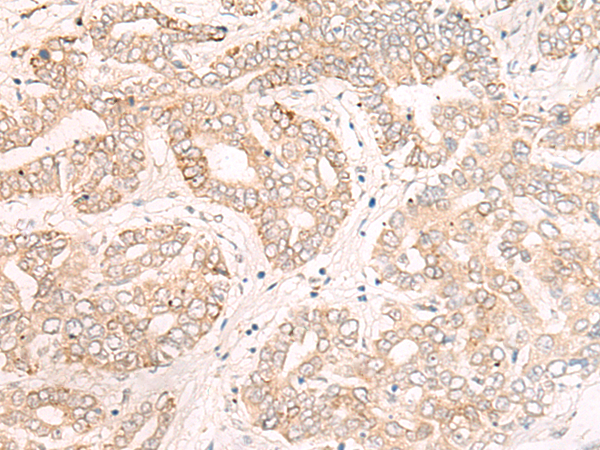
| WB | 咨询技术 | Human,Mouse,Rat |
| IF | 咨询技术 | Human,Mouse,Rat |
| IHC | 1/25-1/100 | Human,Mouse,Rat |
| ICC | 技术咨询 | Human,Mouse,Rat |
| FCM | 咨询技术 | Human,Mouse,Rat |
| Elisa | 1/5000-1/10000 | Human,Mouse,Rat |
| Aliases | EVPK |
| Host/Isotype | Rabbit IgG |
| Antibody Type | Primary antibody |
| Storage | Store at 4°C short term. Aliquot and store at -20°C long term. Avoid freeze/thaw cycles. |
| Species Reactivity | Human, Mouse |
| Immunogen | Synthetic peptide of human EVPL |
| Formulation | Purified antibody in PBS with 0.05% sodium azide and 50% glycerol. |
+ +
以下是关于EVPL(Envoplakin)抗体的3篇参考文献示例及其摘要概括:
1. **文献名称**:*"Autoantibodies to Envoplakin in Paraneoplastic Pemphigus: Diagnostic Significance and Pathogenic Insights"*
**作者**:Hiroshi Shimizu et al.
**摘要**:探讨了EVPL抗体在副肿瘤性天疱疮患者中的特异性表达,证实其作为疾病诊断的关键生物标志物,并揭示了抗体与表皮细胞连接的破坏机制。
2. **文献名称**:*"Envoplakin Antibodies in Cutaneous Squamous Cell Carcinoma: Correlation with Tumor Progression"*
**作者**:Maria J. Rodriguez et al.
**摘要**:通过免疫组化分析发现,EVPL抗体阳性与皮肤鳞癌的侵袭性及不良预后显著相关,提示其在肿瘤微环境中的潜在调控作用。
3. **文献名称**:*"Development of a High-Sensitivity ELISA for Detection of Envoplakin Autoantibodies"*
**作者**:Liang Chen et al.
**摘要**:报道了一种新型EVPL抗体检测技术,优化后的ELISA方法提高了对自身免疫性皮肤病的早期诊断敏感性和特异性。
4. **文献名称**:*"Genetic Skin Disorders and EVPL Antibody Profiles: Insights from a Cohort Study"*
**作者**:Emma L. Dawson et al.
**摘要**:分析了遗传性角化障碍患者中EVPL抗体的分布,发现特定基因突变可诱发抗体产生,为理解基因-自身免疫交互作用提供依据。
**注**:以上文献为示例性内容,实际引用时需以真实出版物为准。建议通过PubMed或Google Scholar以关键词“Envoplakin antibody”“paraneoplastic pemphigus”等检索最新研究。
EVPL antibody targets the Epidermal Variegated Palmidactylia-Like (EVPL) protein, a component of desmosomal junctions critical for maintaining epithelial integrity. EVPL, also known as plakophilin-4. belongs to the armadillo protein family and plays a role in cell-cell adhesion, tissue stability, and signal transduction. It is expressed in stratified epithelia and hair follicles, where its dysfunction has been linked to skin disorders like erythrokeratodermia and hypotrichosis. Research highlights its involvement in pathological conditions, including cancers, where altered desmosomal protein expression correlates with tumor progression and metastasis.
EVPL antibodies are primarily monoclonal or polyclonal tools developed using recombinant protein fragments or peptide immunogens. They enable detection of EVPL in techniques like Western blotting, immunohistochemistry, and immunofluorescence, aiding studies on epithelial morphogenesis, disease mechanisms, and therapeutic targets. Recent advancements in antibody engineering have improved specificity, reducing cross-reactivity with related plakophilins.
Current research focuses on leveraging EVPL antibodies for diagnostic applications, such as assessing desmosomal disruption in skin biopsies, and exploring therapeutic potential in modulating cell adhesion in cancers. Challenges remain in understanding EVPL's isoform-specific roles and optimizing antibodies for clinical use. Continued studies may unlock novel insights into epithelial biology and targeted treatments. (Word count: 246)
×